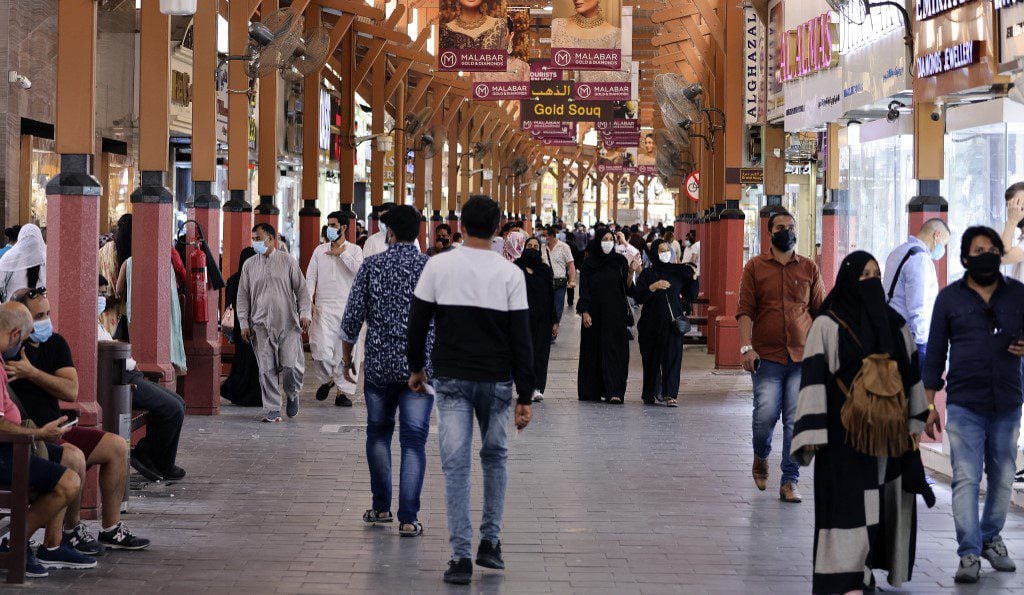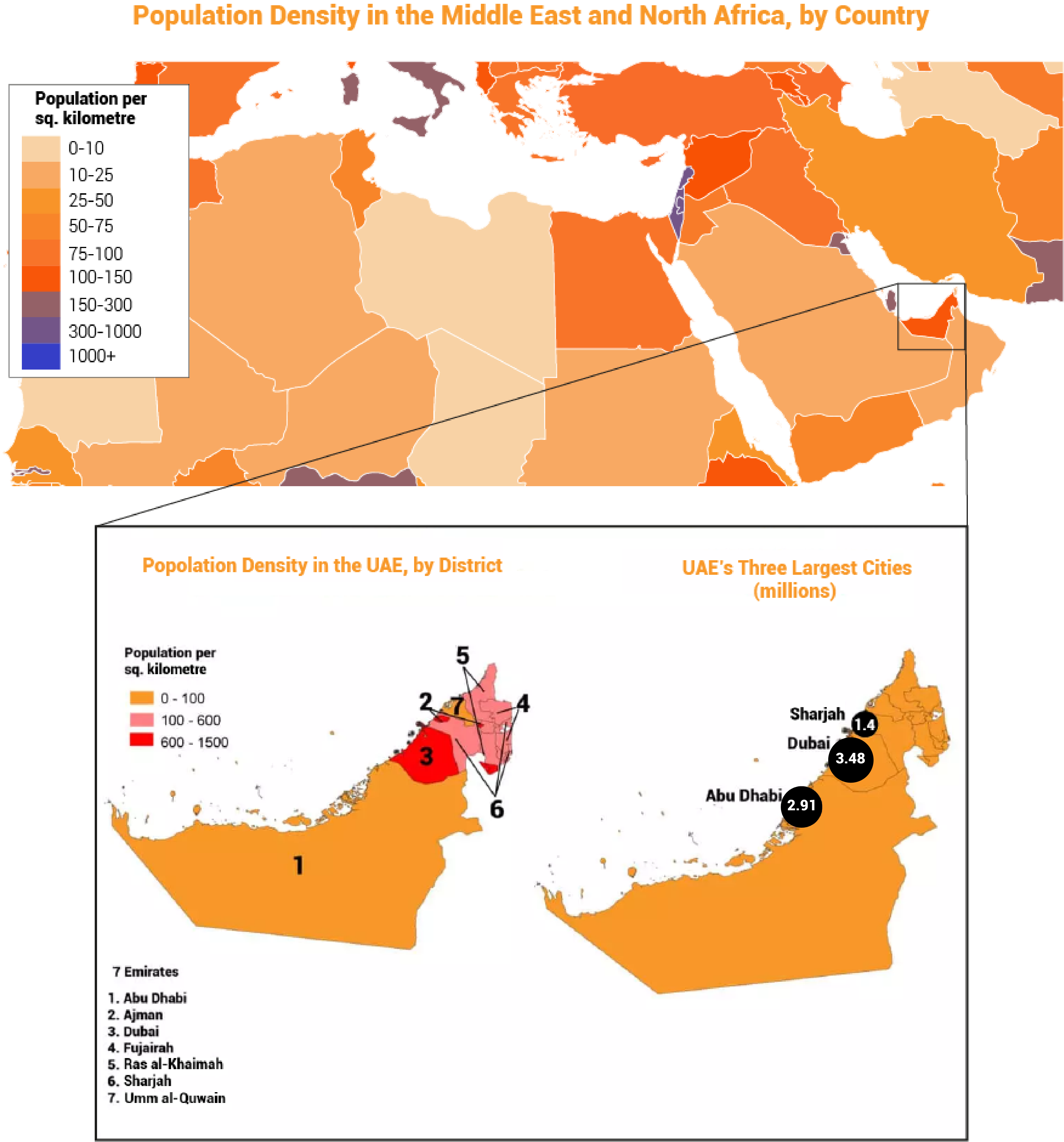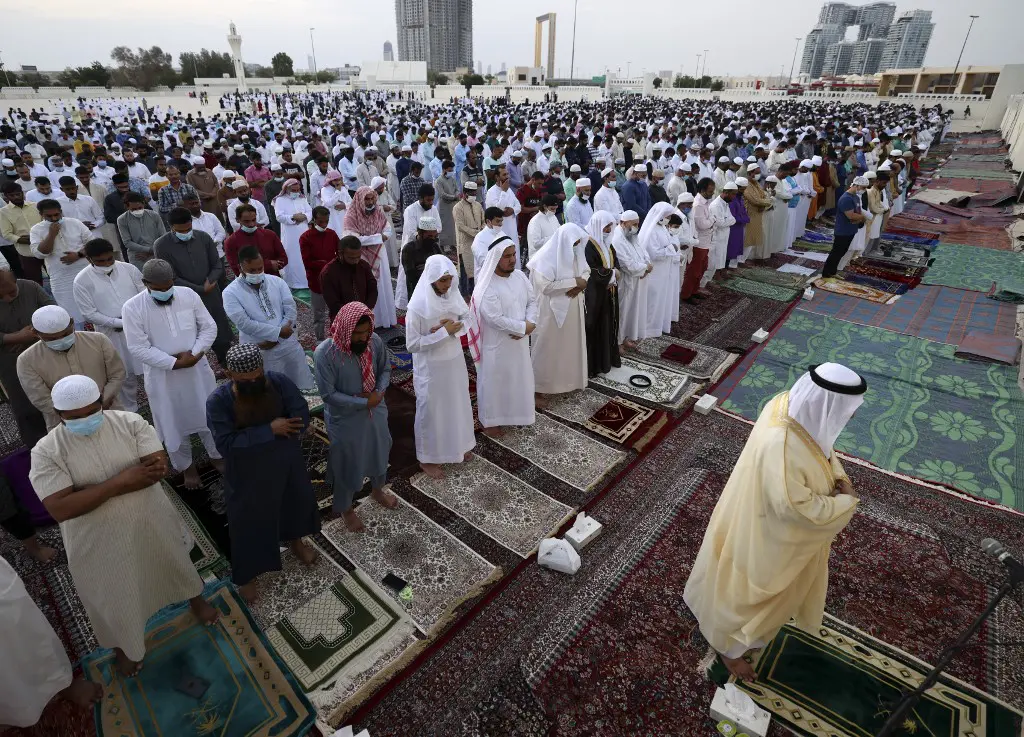
Introduction
The population of the UAE was estimated at 9,44 million in 2022, according to United Nations data, of whom 69.4 per cent males (6.55 million), compared to 30.6 per cent females (2.89 million), with a gender ratio of 226.3 males per 100 females.
The high proportion of males compared to females in the UAE is due to the fact that the majority of expatriate workers (non-citizens) are males who are not accompanied by their family members.
There is no recent official data available for broader details of the population mix in a country where expatriates make up the overwhelming majority of its population. There are more than 200 nationalities that reside and work in the UAE. The Indian community is one of the largest expatriate communities residing in the country, followed by Pakistani, Bengali, and other Asian, European, and African nationalities.
The United Nations estimates the number of expatriates (non-Emiratis) at 8.72 million in 2021 or 88.1% of the country’s total population.
Arabic is the official language of the Emirates, and due to the presence of so many nationalities working or residing in the country, there are also other languages in circulation such as English, Hindi, Urdu, Bengali, Nepalese, Persian, Russian, Tagalog, and other European languages.
Age Groups
World Bank estimates of the year 2023 indicate that 15.2 per cent of the total population is under the age of fifteen, while 82.9 per cent of the total population falls in the age group 15-64. Only 1.9 per cent of the population is 65 years and older. The total fertility rate estimated in 2022 was 1.4 births per woman, and the average life expectancy was 79.2 years (77.7 years for males, 81.4 years for females).
Areas of Habitation
The population density in the UAE in 2022 was estimated at 132.9 people / km2, and the capital Abu Dhabi accounted for about 14.68 per cent (2.91 million people) of the total population. The government of the Emirate of Dubai estimated its population in 2021 at 3.48 million, or 36.9% of the total population. The urban population in 2021 at the state level is estimated at 86.8% of the total population, according to United Nations data.

Ethnic and Religious Groups

While UAE citizens (Emiratis) are predominantly Arab, other residents of the UAE hail from numerous ethnic and national backgrounds. According to the CIA World Factbook, the population mix of expatriates comprises the following: 59.4% from South Asia (including India 38.2%, Bangladesh 9.5%, Pakistan 9.4%, others 2.3%), 10.2% from Egypt and 6.1% from the Philippines (2015 estimate).
The rest includes a significant number of Arabs (among them, Palestinians, Jordanians, Lebanese, Syrians, Iraqis, Yemenis, and Omanis), and many Iranians, Afghans, North and South Americans, Australians, Africans, and Western Europeans.
According to the CIA World Factbook, the percentage of Muslims is estimated at 76% of the total population – based on a 2005 estimate – while Christians make up about 9%, and the remaining 15% include Hinduism, Buddhism, Judaism and other religious sects.
Among Emirati citizens, approximately 85 percent are Sunni Muslim and the remaining 15 percent are Twelver Shiite (Ithna ashariyya), the main branch of Shia Islam. Foreigners are largely Muslims from India, Pakistan, Iran, Bangladesh, Afghanistan, and Arab countries. Christians are mostly Filipinos and guest workers from Western countries. Hindus are mostly from the Indian subcontinent.
Accurate official figures are not available, but it is estimated that the expatriate population consists of 55 percent Muslims (mostly Sunni), 25 percent Hindu, 10 percent Christian, 5 percent Buddhist, and 5 percent other religious groups, including Parsi, Bahai, and Sikh.
The UAE Constitution declares Islam the official religion of the country, yet it provides for religious freedom, and the government generally respects this right in practice. Non-Muslims have their own houses of worship and can pray freely at Hindu temples and Christian churches and mark their religious holidays.
Relations between members of different faiths are generally amicable. Some restrictions on religious freedom do exist; churches, for example, are not allowed to have bell towers, and missionary activity (especially proselytizing Muslims) is, as elsewhere in the Muslim world, forbidden. Some missionary groups are tolerated, because they have been working in the country since before its independence in 1971 (they opened some of the country’s first hospitals in 1960).
Bedoun
Generations of migrants from neighbouring regions have established permanent homes for themselves and their descendants in the UAE. Some have blended in and become integral parts of the tribal make-up of Emirati society, thus acquiring the legal status of citizens. Others, mostly of Iranian origin, referred to in popular slang as ajam (iyam in the local dialect), became full citizens but are sometimes perceived as less ‘authentic’ by Sunni Muslims and therefore less ‘equal’.
The UAE has an estimated 20,000 to 100,000 persons living in the country without citizenship (or proof of citizenship). The so-called Bedoun (or Bidoon), although having lived in the country for as long as others who were naturalized upon independence in 1971, somehow never received that benefit.
Their status is essentially similar to that of long-time foreign residents from the Arab world, Iran, and the Indian subcontinent (among them, descendants of a longstanding Indian community), who live in a similar legal limbo.
As non-citizens, they are unable to enjoy the advantages of the welfare state and can be summarily deported. The Bedoun face discrimination in employment and have limited access to medical care and education. Without passports or other identity documents, their movements are restricted, both within the country and internationally. The government has for years promised to look into their cases and speed up the naturalization process. There was a slight improvement in this process from 2009 onwards, as more Bedoun were naturalized.
Citizenship is generally derived from one’s parents. Children of female citizens married to non-citizens do not acquire citizenship at birth, but female citizens under these circumstances can apply for citizenship for their children, and the government generally grants it.
A foreign woman may receive citizenship through marriage to a citizen after ten years of marriage, and anyone may receive a passport by presidential decree. The government has registered Bedoun births but has not granted citizenship to the children.
Migrant Workers

Since its emergence as an important trade centre and the discovery of oil in the 1960s, the UAE has attracted millions of workers from around the world to provide the labour and expertise needed to run an emerging country with a growing economy. By the time the country became independent in 1971, it already had a majority non-national population. The 1975 census indicated that 69.5 percent were foreigners (compared with 36.5 percent in 1968), in a total population of 557,887.
Some groups of migrant workers engage in cultural activities and enjoy private schools and associations. However, migrant groups can organize themselves only as registered clubs, charities, or ethnic or religious associations. Labour and political organizations are banned by law; hence the expat community as a whole does not form a cohesive group. Expatriate workers lack full civil rights and are typically dependent on their sponsors for their job, work permit, residence, and other matters. Once their contract has run out, employment is terminated, and the workers are expected to leave the country.
Although some 81 percent of the UAE population are migrant workers, the UAE still blocks freedom of association and has not ratified the 1949 International Labour Organization’s Convention 98, concerning the Application of the Principles of the Right to Organize and Bargain Collectively. There are somewhat different and more flexible regulations in the Free-Trade Zones.
The Kafala System
Due to the sponsorship system (kafala) and the lack of reliable and systematic legal recourse, labourers, especially those unskilled, often suffer abuse and exploitation. Working conditions (e.g., in construction and domestic work) can be harsh. Living conditions, usually in squalid labour camps, make things worse. NGOs and international organizations, such as Amnesty International and Human Rights Watch, intervene repeatedly on behalf of foreign workers.
Kafala (sponsorship) is the key to all labour contracts involving expatriates wanting to work in the UAE. The kafil (or kafeel, sponsor) is the direct employer and can be a person or a company but must be a UAE national.
The employment contract between employer and employee is usually valid for a specific duration (1-3 years), and if it is not renewed, the employee must leave the country. Only certain categories of jobs (mostly white-collar) allow employees to move between jobs (and employers) without having to leave the country first. The way in which the sponsorship system has been set up gives the kafil almost absolute control over the life of the guest worker.
Read more about the implications and reforms of the kafala system in the UAE and in the wider region here:

